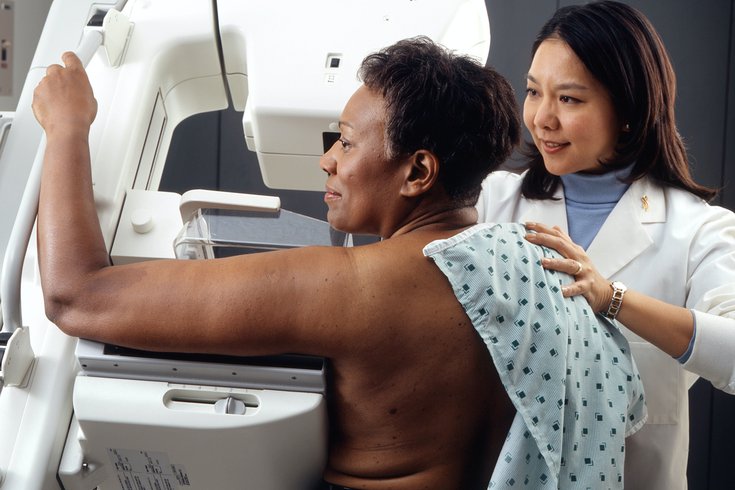
May 01, 2023
 National Cancer Institute/Unsplash
National Cancer Institute/Unsplash
To reduce racial disparities in breast cancer mortality, researchers suggest Black women should begin getting screened at age 42 – eight years before the current recommended age for the general population.
Black women are 40% more likely to die of breast cancer than white women despite being slightly lower incidence rate.
They also are more likely to be diagnosed with the illness by age 45, and are at higher risk of triple negative breast cancer, an aggressive form associated with a higher likelihood of death. This means that by the time many Black women are seen by an oncologist, their cancers have advanced to later, more deadlier stages.
Breast cancer is the leading cause of cancer death among Black women, who have a higher breast cancer death rate than any other racial or ethnic group in the United States. Some scientists say earlier screenings for Black women could help reduce these racial disparities by catching their cancers at stages when treatments are more effective.
A new analysis of breast cancer death rates emphasizes the importance of Black women getting screened earlier than age 50 – the current U.S. Preventive Services Task Force recommendation for the general population. The researchers said Black women should start getting screened at age 42, calling into question the current "one-size-fits-all" approach to screening.
The analysis showed Black women in their 40s die of breast cancer at a rate of 27 deaths per 100,000 person-years, nearly double the rate rate of white women (14 per 100,000).
"The take-home message for U.S. clinicians and health policy makers is simple," Dr. Mahdi Fallah, one of the authors of the new study, told CNN. "Clinicians and radiologists should consider race and ethnicity when determining the age at which breast cancer screening should begin."
Other experts suggest that even age 42 is not early enough, because some Black women are dying from breast cancer by 40. An analysis published by the American Cancer Society found Black women were more likely to be diagnosed with breast cancer before age 40 than women of any other racial group.
There is no real consensus on when breast cancer screening should start, which makes it confusing for physicians and patients.
The U.S. Preventive Services Task Force recommends women ages 50 to 74 get screened for breast cancer every other year, but encourages women in their 40s to consider starting the screening process if they are concerned about their risk.
The American College of Radiology recommends annual screenings start at age 40 and that women from high-risk groups, including Black women, have risk assessments done no later than age 30. The American Cancer Society says women should start screenings at age 45, but with the option to start at 40. The Mayo Clinic also states that women should have the option to get a mammogram every year starting at 40.
Dr. Vivian Bea, section chief of breast surgical oncology at NewYork-Presbyterian Brooklyn Methodist Hospital, told USA Today that national guidelines need to a more unified approach to screening to make it easier for high-risk women to get screened at younger ages. Insurers won't always approve a mammogram or ultrasound for younger Black patients, she said.
"It should really light fire under us all to be advocates and to really be a voice for those patients who are disproportionately affected by the current recommendations by the U.S. task force," she said.
A new study suggests that comparing the rate of density decline in both breasts could help doctors better assess a woman's risk. Dense breast tissue is a risk factor for breast cancer. As women get older, the density in their breasts decline, which should, in theory, reduce their risk of breast cancer.
Researchers from Washington University found that many women who are diagnosed with breast cancer had a slower rate of decline in breast density in one breast.
For their analysis, they studied breast density changes over a 10-year period in 10,000 women. All of the women were initially cancer-free, but 289 of them developed cancer during the study period. They had a slower decline in breast density compared to the women who didn't develop breast cancer.
More studies are needed to confirm these findings, but study author, Shu Jiang, told The New York Times that this new way of assessing risk could really make a difference. Because the density of each breast is measured at every mammogram, a woman's breast cancer risk could "be updated every time she gets a new mammogram."
Additional research suggests that molecular differences, as well as socioeconomic factors, may play a in racial disparities in breast cancer mortality.
Researchers found a significant racial difference in the way DNA repair genes are expressed in healthy breast tissue and in tumors that are positive for the estrogen receptor. These differences affect how quickly cancer cells in the breast grow.
Healthy cells naturally repair errors in DNA that can occur during replication or in response to external factors such as stress. Genetic changes, however, often occur in cancer cells, preventing them from repairing DNA. This is what makes these cells resistant to treatment.
The researchers found that eight genes involved in DNA repair expressed themselves differently in Black women compared to white women. They also found molecular differences in the cellular signals that control how fast cells can grow.
Researcher Svasti Haricharan, an assistant professor at Sanford Burnham Prebys in San Diego, California, said Black women may benefit from earlier treatment with cyclin-dependent kinases inhibitors, a drug that helps stop cancer cells from multiplying. Current clinical guidelines only recommend their use after standard endocrine therapy.
The researchers added that lifestyle and socioeconomic factors also contribute to racial disparities. Black women have an increased likelihood of having chronic conditions such as diabetes, heart disease and obesity as well as less likelihood of breastfeeding – all risk factors for breast cancer. Less access to screenings and follow-up care, and institutional racism, are contributing factors, too.